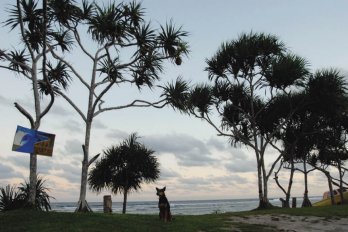Askinny, one-handed teenager constantly craving hashish is pretty much dead weight in a canoe.
But Stephen Harper and the rest of the faux voyageurs couldn’t leave me behind. This was our grade thirteen history class clique’s rite of passage. I had to go. We were getting ready for the real world, and a few days’ journey through clouds of bloodthirsty bugs seemed a good, symbolic send-off. It was our test of manhood.
So what if I couldn’t hold a paddle. I was at least good for comic relief. I wangled the middle seat in the third canoe, from which, like a maharaja riding in his sedan chair, I idly watched Algonquin Park go by. The grunt work of deep stroking and portaging fell to my six friends, among them the nerd who would become our prime minister.
Bob Scott, our history teacher, was the chaperone. He was a short man, bald but for a fringe of hair that recalled the Roman emperors and senators from his in-class slide shows. His love for the past and the lessons it could teach was infectious. Why else would a stoner and a brainer find themselves together in the middle of Canoe Lake, in black water with the sun sinking fast, searching for the one last empty campsite?
Scott took the opportunity to teach. Through the darkness, I could hear him talking about Tom Thomson, the Group of Seven contemporary who died mysteriously on a trip across Canoe Lake in the summer of 1917. Pick your theory: He was murdered in a drunken brawl. He was offed after discovering German spies lying low in the woods. Or, my favourite, he was depressed and killed himself.
I was starting to think we would soon join him when the gang in the lead canoe shouted that they had found someplace to set up camp. We had survived the first big challenge, and as I took the fetal position in my sleeping bag, listening to the night, I thought of Thomson, and ghosts, and the future.
The next day, we were making good time on a loop route for weekend trippers. After one portage too many, the boys started looking for an easier way to the next lake. A creek running alongside the trail looked deep enough to pull the canoes through.
Yet someone had decided to put a portage route between these lakes, so logic suggested that just maybe the water would become too shallow a little farther into the forest. Of course, that would depend on whom you asked, and someone made the mistake of turning to me.
It was precisely the sort of judgment that should have fallen to Harper, who scored better than 100 percent on math tests by acing the bonus questions, too. But like the other paddlers, he was tapped out. I was perfectly well rested, if a little impaired by thc withdrawal. Clear headed or not, I was sent in to make the call.
I walked the full length of the portage trail, stopping every few metres to peek through the trees for a glimpse of the creek. When I couldn’t see it, I listened to the flow, somehow certain that after little more than a day sitting in a canoe I could now ascertain the depth of running water by ear. I returned to the group and confidently reported that we could easily pull through.
To be safe, we unpacked the canoes and worked in two teams. My group would hump our stuff along the trail, while the other would tie ropes to the canoes and tow them up the creek. As I lugged a knapsack through the forest, a caravan of Cub Scouts, each with a massive round pack at least twice his weight strapped to his sweating forehead, came from behind and passed us. The troop leader was at the end of the line, barking at the panting kids to get a move on. Inexplicably, he mistook us for seasoned comrades of the great outdoors.
“Did you see those idiots back there? ” he sneered. “They got stuck trying to pull through!” I agreed that whoever the morons were, they had no business being in the wilderness. And the Cub master stomped off on his forced march.
Looking back now, there’s no mistaking it. I was perfectly positioned on the path to journalism. I could be an idiot one moment and pass as an expert the next. And Harper, hauling cargo alongside me, could suffer the fools all around—just keep smiling and see past them all the way to 24 Sussex Drive.





